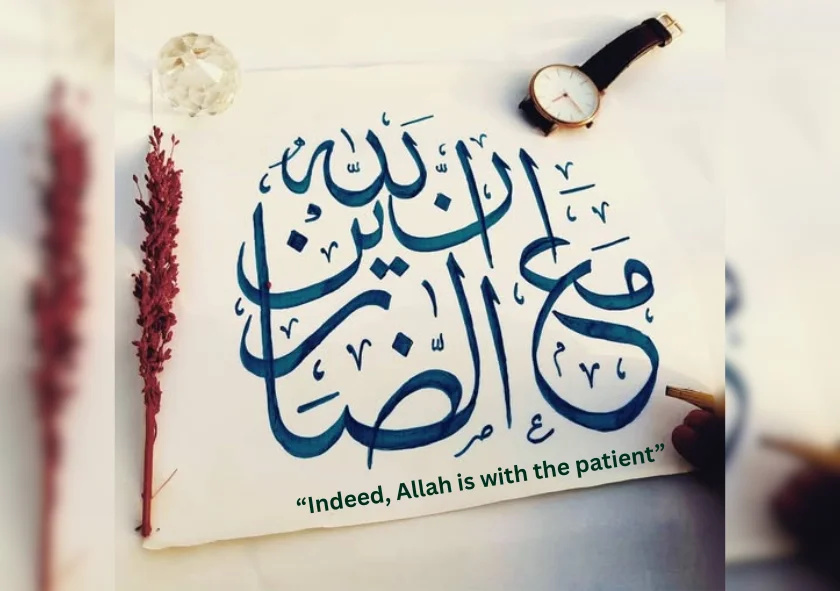Innallaha Ma Sabireen: Allah’s Promise to the Patient
Introduction – The Power of Patience in Islam
In the face of life’s trials, there’s a short yet profound phrase in the Qur’an that brings comfort to countless hearts: Innallaha Ma Sabireen Indeed, Allah is with the patient. This verse appears in multiple places in the Qur’an, and each time, it reminds us that patience is not just a personal virtue—it’s a spiritual connection.
Allah offers a lifeline to believers: “Innallaha Ma Sabireen” (Indeed, Allah is with the patient). This verse (Surah Al-Baqarah 153) isn’t just a comforting phrase; it’s a divine guarantee. In this guide, you’ll learn:

What Does “Innallaha Ma Sabireen” Mean?
The Arabic phrase “إِنَّ اللَّهَ مَعَ الصَّابِرِينَ” (Innallaha Ma Sabireen) translates to “Indeed, Allah is with the patient”. The structure of the sentence is powerful: it starts with emphasis (Inna – indeed), then names Allah directly, and finally promises His companionship to those who remain patient. But what does “being with” someone mean in Islam?
This isn’t just poetic; it’s deeply meaningful. It tells us that patience isn’t a lonely path—it’s one that brings us closer to the Divine. When you’re overwhelmed, recite this verse as a reminder that Allah sees your efforts and will never abandon you.
The Quranic Context – Why Was This Verse Revealed?
Surah Al-Baqarah 153 was revealed during a critical time in Islamic history. Early Muslims in Mecca faced:
- Worldly Success: The eventual triumph of Islam in Arabia.
- Eternal Reward: Paradise for those who remained steadfast.
Just as the Sahaba (companions of the Prophet) endured, your struggles today are a test of faith with eternal rewards.
What Does Patience Really Mean in Islam?
Patience (sabr) in Islam isn’t passive. It’s not about sitting still and waiting for hardship to pass. It’s about staying grounded, doing the right thing, and not losing faith even when things get tough.
There are generally three types of sabr:
In each case, patience is a form of active trust in Allah.

The 3 Types of Sabr – A Deeper Look
Islamic scholars categorize Sabr into three forms. Let’s break them down with examples:
1. Sabr in Obedience (الصبر على الطاعة)
This means staying consistent in acts of worship, even when it’s hard.
Examples:
- Praying Fajr on cold mornings.
- Fasting in Ramadan despite work stress.
- Giving Zakat when money is tight.
2. Sabr in Avoiding Sin (الصبر عن المعصية)
Resisting temptations that displease Allah.
Common Struggles:
- Lowering your gaze.
- Avoiding gossip or anger.
- Staying away from haram income.
3. Sabr in Hardship (الصبر على البلاء)
Remaining calm during trials like illness, loss, or betrayal.
Case Study: Prophet Ayyub (Job) lost his wealth, health, and family but never lost trust in Allah.
Why Is This Verse So Reassuring?
Because it’s more than a command—it’s a promise. When Allah says He is “with” the patient, it’s not just metaphorical. In Islamic belief, His “ma’iyyah” (companionship) refers to His support, guidance, and mercy. Being with someone means helping them through. It means they’re not abandoned, even when the world feels cold and quiet. And who doesn’t need that reminder?
Whether someone is facing personal grief, anxiety, a difficult job, health issues, or global injustice—this verse reassures us that Allah hasn’t forgotten us.
How Allah Supports the Patient – 4 Divine Gifts
Allah’s promise “Ma Sabireen” isn’t abstract. Here’s how He helps the patient:
1. Inner Peace (Sakinah)
Allah says, “He sent down tranquility upon their hearts” (Quran 48:4). Even in chaos, Sabr brings calm.
2. Solutions You Never Imagined
Allah often resolves problems in unexpected ways.
3. Multiplied Rewards
The Prophet ﷺ said, “No fatigue, illness, or worry befalls a Muslim except that Allah forgives their sins through it” (Bukhari).
4. Eternal Success
Allah promises, “Give glad tidings to the patient, who say when afflicted with calamity: ‘To Allah we belong, and to Him we return’” (Quran 2:155-156).
7 Practical Steps to Cultivate Sabr
Patience is a skill—not a trait you’re born with. Here’s how to build it:
How Can We Practice Patience in Daily Life?
Patience is a muscle—it grows stronger with use.
Real-Life Stories of Sabr – Lessons from Islamic History
umayyah bint Khayyat – The First Martyr of Islam
Sumayyah, a slave in Mecca, was tortured for embracing Islam. Her persecutors speared her to death, but her final words were, “I believe in Allah!” Her Sabr earned her a place in Paradise.
Bilal ibn Rabah – From Slave to Mu’adhin
Bilal endured beatings for saying “Ahad” (Allah is One). Later, he became Islam’s first caller to prayer.
Modern Example – A Cancer Survivor’s Testimony
Amina, a 32-year-old from Jordan, was diagnosed with stage 4 cancer. Through chemotherapy, she recited “Innallaha Ma Sabireen” and found peace.
Debunking Myths About Sabr
- Myth 1: Sabr Means Doing Nothing. Truth: Sabr requires action. For example, if unemployed, pray and apply for jobs.
- Myth 2: Only Big Trials Require Sabr. Truth: Sabr is needed in everyday struggles too.
- Myth 3: Sabr Guarantees Immediate Relief. Truth: Sabr may not remove the trial but grants strength to endure it.
Duas and Quranic Verses to Strengthen Patience
Bookmark these for tough moments:
- Dua for Anxiety: “اللهم إني أعوذ بك من الهم والحزن” (Bukhari).
- Dua for Trust: “حسبي الله ونعم الوكيل” (Quran 3:173)
Final Thoughts
“Innallaha Ma Sabireen” is a promise that transcends time. Whether you’re battling a major crisis or a minor irritation, Allah is with you. Start small:
So the next time you’re tested, remember: your patience is not unnoticed. It’s not meaningless. It brings you closer to Allah.
